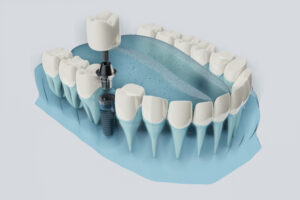When it comes to caring for your teeth, sometimes one can be lost or damaged beyond repair. When this happens, considering a dental implant is an excellent long-term option for both your smile and for your dental health.
While most of our patients are candidates for these dental implants, there are certain conditions that may prevent you from getting one. Knowing what these are can help you make a quicker decision on how to proceed in caring for your dental health in the best possible way.
What Are Dental Implants?
Dental implants are a sustainable choice for replacing missing or damaged teeth. In addition, the implant creates a natural-looking tooth, so you won’t have to worry about anything detracting from your smile.
Essentially, dental implants are posts surgically placed in the jaw (upper or lower). The physical anchoring of the implant to the jaw bone and acceptance of it by the body occurs through a process called osseointegration. In other words, the dental implant integrates or fuses with your jaw bone.
These posts may also serve as an anchor for dentures. However, dental implants themselves eliminate many of the negative issues encountered when wearing bridges and dentures.
Common Reasons Preventing You from Getting Dental Implants
While dental implants are a popular choice today, there are instances where you may not be able to get them. These reasons include gum disease, jaw bone structure, bruxism, pre-existing health conditions, and poor oral health.
Gum Disease
One of the top criteria for receiving dental implants is healthy gums. If you suffer from gum disease, this can be problematic, and you may need to look for other solutions.
Gum disease is a particular type of infection that can lead to the damaging of the gums and jaw bone. As a result, such an infection may interfere with the integration required for dental implants. Be sure to check with your dentist to ensure you are free of any gum disease as a first step.
The Structure of Your Jaw Bone
A dental implant relies on the bone structure in your jaw for support. If the bone structure is lacking, this can prevent you from getting a dental implant.
Bone loss happens for various reasons, including osteoporosis and gum disease. Conditions such as these can lead to the deterioration of the bones in your mouth.
One solution to the lack of bone is grafting. The goal of the grafting process is to build up the jaw bone itself with bone obtained from another part of your body. For further guidance on this, speak with your dentist about your particular options.
Bruxism
Do you grind and clench your teeth at night? These actions are referred to as bruxism and are a common habit of many people these days.
This act of grinding and clenching your teeth while you sleep or feel stress, however, can be detrimental to your gums, teeth, and your jaw.
While bruxism is not an absolute deterrent for a dental implant, it does need reviewing. Your dentist may be able to identify signs of bruxism on your teeth currently and ask you about it. If not, you’ll want to mention it before moving forward with dental implants.
Pre-Existing Health Conditions
Certain pre-existing health conditions can cause slower healing and interfere with the dental implant fusing or integrating with the jaw bone. If you currently experience health conditions such as diabetes, rheumatoid arthritis, or an autoimmune disease, this slower healing can cause the implant to fail.
Other health conditions and habits that can affect an implant’s success are cancer, persistent gum disease, irradiated jaws, smoking, medication, alcoholism, and various other ailments.
While you may still be a candidate for dental implants, it’s important to keep in mind that with one of these health conditions, the implant may not be successful at anchoring onto the jaw bone itself and healing properly.
The last thing you will want to go through is the process of receiving dental implants only to have them fail. Take ample time to discuss your health history with your dentist, so you know ahead of time whether or not dental implants are possible for you.
Poor Oral Health
If you do not have access to, or in some ways are unable to practice good dental hygiene, you may not be a good candidate for dental implants.
There can be many reasons for poor oral hygiene. For example, if your range of motion is impaired or you have another such condition, you may be limited in your ability to care for your teeth and gums thoroughly.
The ability to practice good dental hygiene is essential in the healing and osseointegration following a dental implant.
You might want to try increasing your chances of receiving dental implants by scheduling a dental cleaning and practicing good dental hygiene prior to receipt of implants.
Find Out if You Are a Candidate for Dental Implants
Keeping your mouth healthy and making decisions on how to keep it that way can be challenging. This challenge is especially true whenever you have a missing or damaged tooth. Dental implants overall are a good, long-term option in most instances.
If you are considering a dental implant, Stiles Dental Care is here to help you determine the next steps. We will evaluate your ability to successfully receive a dental implant and discuss other available options if not.
Patients of Stiles Dental Care receive the utmost care when it comes to making decisions that affect their dental health. Dr. Stiles and his team take the time to understand your circumstances and help you make beneficial choices. Call and schedule an appointment today to get started.
